This semester, I indexed and archived seven interviews from Dr. Rikard’s 1979 Docena project. More than organizing and preparing these interviews for the oral history website, however, I analyzed the linguistic patterns with Voyant, a web-based application for text analysis. After uploading a document on Voyant, users can study patterns such as the collocation of certain words to other words, the frequency of words in certain parts of the text and as a whole, and many more. My research focused on the most-used words in each interview, excluding symbols, articles, conjunctions, and “filler” words such as “um” or “uh.” Voyant both provides a list of the most frequently used words in a text and creates word clouds illustrating words’ frequency; I’ve included some of these word clouds on this page.
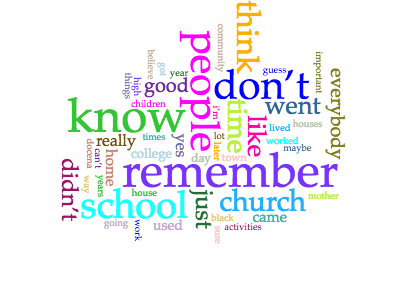 Mary Parsons Gray's word cloud (Sinclair, Stéfan, Geoffrey Rockwell and the Voyant Tools Team. 2012. Voyant Tools (web application).)
Mary Parsons Gray's word cloud (Sinclair, Stéfan, Geoffrey Rockwell and the Voyant Tools Team. 2012. Voyant Tools (web application).)The clearest divide in vocabulary revealed by Voyant’s analysis is between men and women interviewees. In general, the Docena women interviewed (including Melba Wilbanks Kizzire, Christine Cochran, and Mary Parsons Gray) focused more on topics involving Docena’s community activities. Topics that women frequently discussed are education, church, and social life. This is also represented in their most frequently used words. Two of Mary Parsons Gray’s five most frequently used words are “people” and “school.” Melba Wilbanks Kizzire shows a similar focus, with “church” and “house” in her top five most frequently used words.
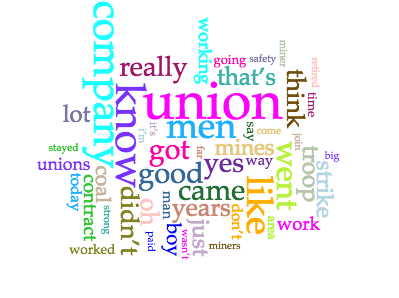 W.T. Turner's word cloud (Sinclair, Stéfan, Geoffrey Rockwell and the Voyant Tools Team. 2012. Voyant Tools (web application).)
W.T. Turner's word cloud (Sinclair, Stéfan, Geoffrey Rockwell and the Voyant Tools Team. 2012. Voyant Tools (web application).)Meanwhile, the male interviewees focused on their work in the mines. Two of B.D. Oglestree’s top words are “work” and “company.” W.T. Turner’s most used word is “union,” and two other common words for him are “company” and “men.” While James Simmons and Samuel Kelley use more filler words, such as “got” and “just,” terms centering around the mines, such as “coal,” “work,” and “union,” still rank high in uses in their interview.
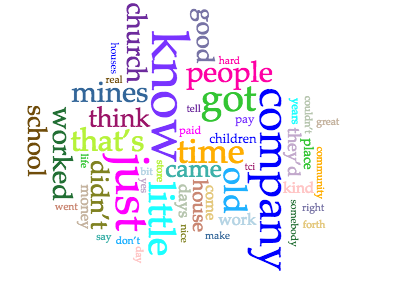 Christine Cochran's word cloud (Sinclair, Stéfan, Geoffrey Rockwell and the Voyant Tools Team. 2012. Voyant Tools (web application).)
Christine Cochran's word cloud (Sinclair, Stéfan, Geoffrey Rockwell and the Voyant Tools Team. 2012. Voyant Tools (web application).)A notable exception to this split between male focus on mining and female focus on community is Christine Cochran’s interview. Although the main topics in Cochran’s interview are her work in education, church life, and details of the Docena community, she uses the words “company” and “mines” more frequently than “church,” “school,” and “house.” She does use the word “people” more than “mines,” but only by one instance. Even though Cochran does not discuss work in the mines extensively, it still features heavily in her vocabulary. A possible reason for this discrepancy is a difference in community. Docena was segregated before the 1960s, and while Kizzire and Gray both grew up in the white area of Docena, Cochran lived in the black area of the town. The black community was both physically closer to the mines and more involved in the union, making Cochran’s verbal familiarity with the mines unsurprising. In Cochran’s case, her environment and culture is a more accurate predictor of vocabulary than sex.
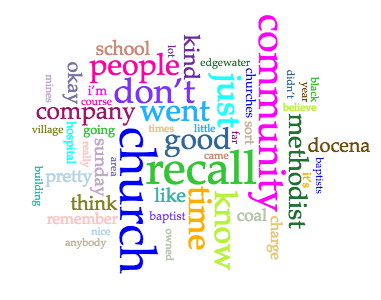 E.L. McFee's word cloud (Sinclair, Stéfan, Geoffrey Rockwell and the Voyant Tools Team. 2012. Voyant Tools (web application).)
E.L. McFee's word cloud (Sinclair, Stéfan, Geoffrey Rockwell and the Voyant Tools Team. 2012. Voyant Tools (web application).)Another example of the importance of culture over sex in the interviews occurs in the verbs interviewees use to talk about their memories. The word “remember” is heavily used by both Gray and Kizzire to tell interviewers about their past experiences, but it does not appear prominently in the vocabulary of the men interviewed, who stick to the word “know” to refer to their memories. However, Pastor E.L. McFee is an outlier to this pattern, frequently using “recall” to discuss past events. McFee did not live in Docena, but served as a Methodist minister there in the winter of 1939 while he attended Birmingham-Southern College, setting him apart from the other interviewed men, all of whom worked in mines from a young age. Unsurprisingly, the subject material in McFee’s interview is more similar to that of the women interviewed, focusing on Docena’s church and community. It is interesting that McFee also follows the pattern of using a verb specific to recalling memories rather than one used to declare knowledge of information. This indicates that those who prioritized community in church and education in Docena also prioritized the recollection of these experiences and people, especially after the many changes that Docena’s community experienced.
Both McFee and Cochran are two examples of a pattern I found to be true throughout the interviews: in the Docena community, an interviewee’s environment and culture provides a better indication of his or her word choice and subject material than innate factors such as sex.
- Emily Youree, senior English major
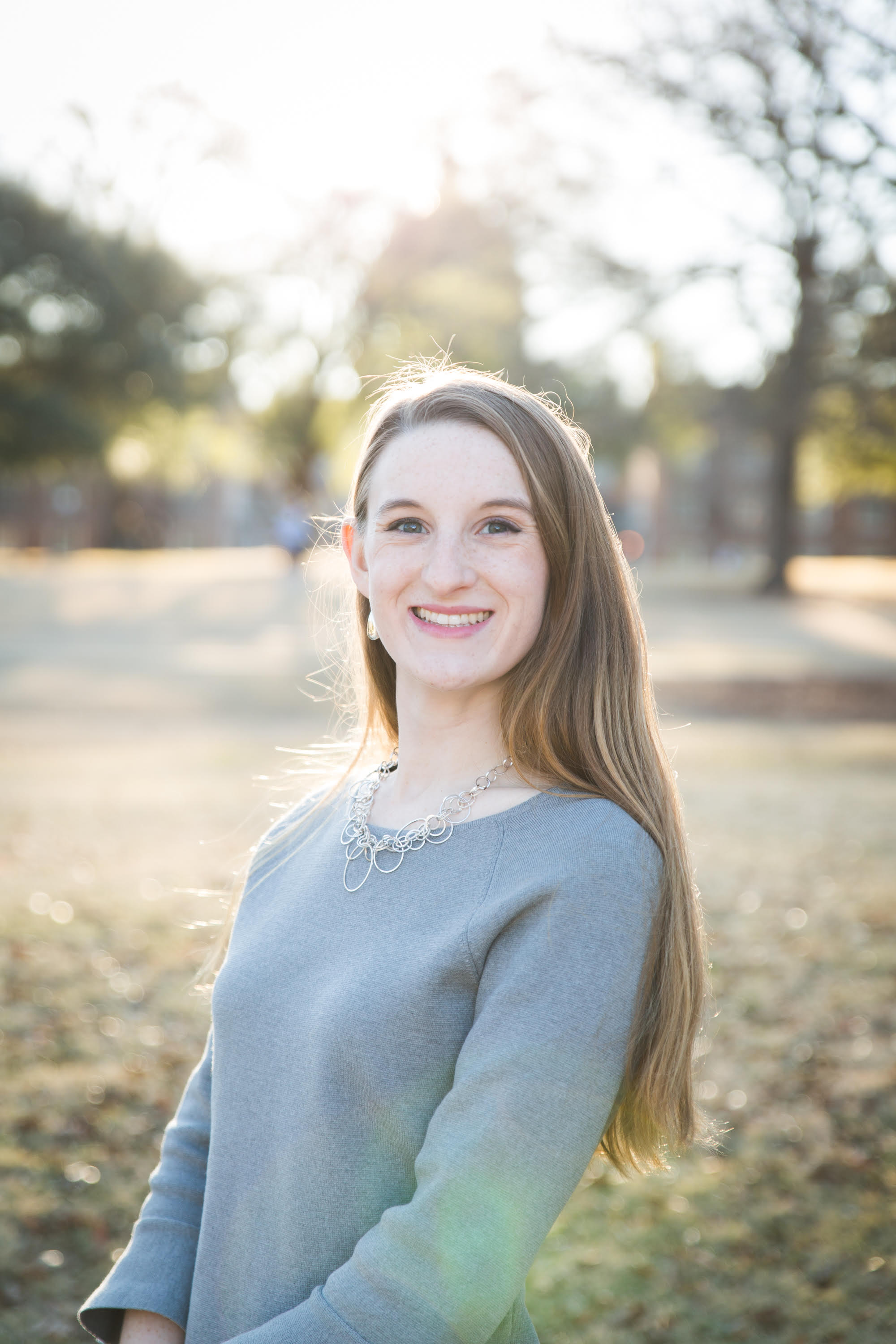
Web Applications Consulted
Sinclair, Stéfan, Geoffrey Rockwell and the Voyant Tools Team. 2012. Voyant Tools (web application), voyant-tools.org.
